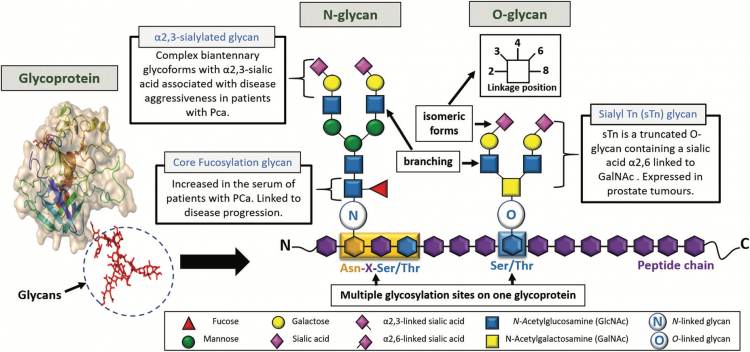[Publication] Glycosylated biomarker sensors: advancements in prostate cancer diagnosis
Prostate cancer is currently diagnosed using the conventional gold standard methods using prostate-specific antigen (PSA) as the selective biomarker. However, lack of precision in PSA screening has resulted in needless biopsies and delays the treatment of potentially fatal prostate cancer.
Thus, identification of glycans as novel biomarkers for the early detection of prostate cancer has attracted considerable attention due to their reliable diagnostic platform compared with the current PSA systems.
Therefore, biosensing technologies that provide point-of-care diagnostics have demonstrated the ability to detect various analytes, including glycosylated micro- and macro-molecules, thereby enabling versatile detection methodologies.
These works have been done under the project HUBERT CURIEN PARTNERSHIP - HIBISCUS (MyPAIR) "Label-Free Detection of Glycosylation and microRNA (miR-16) for detection of Prostate Cancer (PCa)" with the School of Microelectronic Engineering, Universiti Malaysia Perlis.

Reference:
Title: Glycosylated biomarker sensors: advancements in prostate cancer diagnosis
Authors: Abd Rahman, Siti Fatimah and Md Arshad, Mohd Khairuddin and Gopinath, Subash C. B. and Fathil, Mohamad Faris Mohamad and Sarry, Frédéric and Ibau, Conlathan
Journal: Chemical Communications, The Royal Society of Chemistry
Date of publication (online): 11 August 2021
Link: http://dx.doi.org/10.1039/D1CC03080A
Images' captions:
Image 1: Overview of different nanomaterials used in combination with biomolecules for glycan biomarker detection
Image 2: Glycan alterations in protein with the most common carbohydrate moieties
Acknowledgements: Hubert Curien Partnership - Hibiscus Grant (N° 45730QK)

